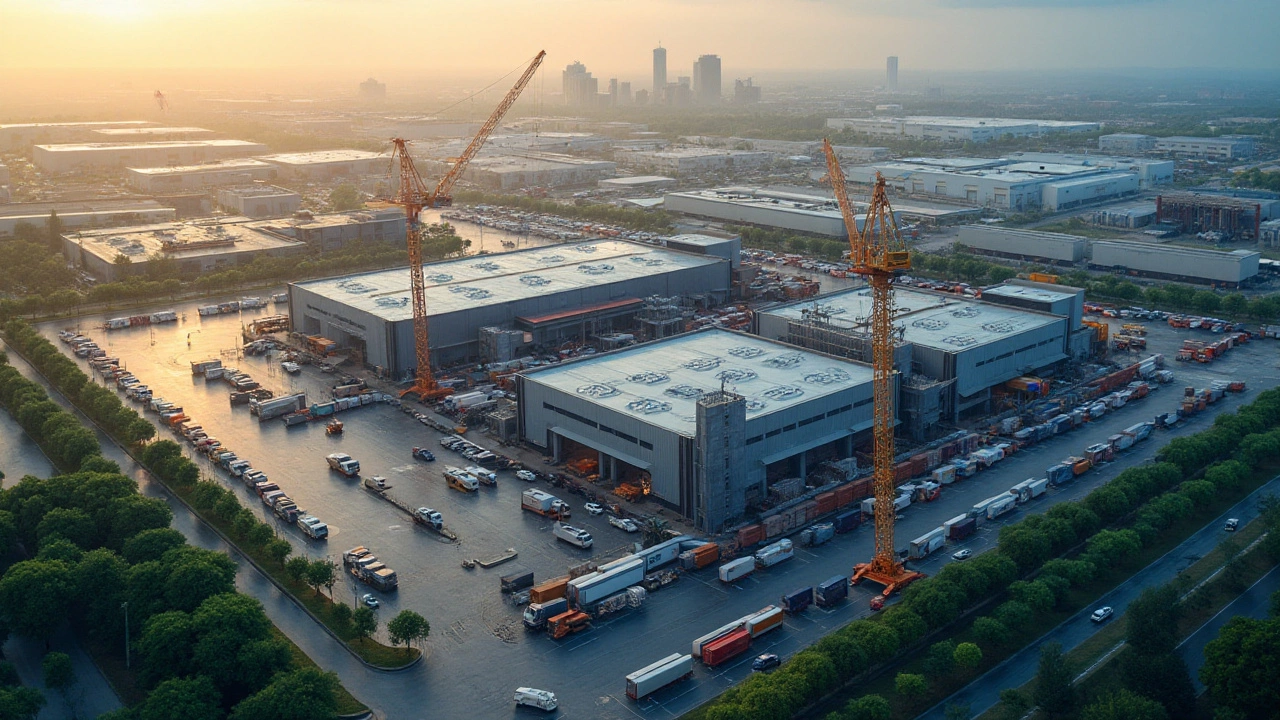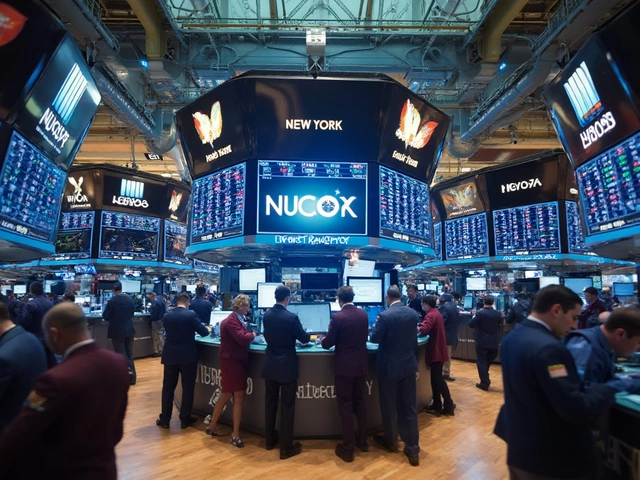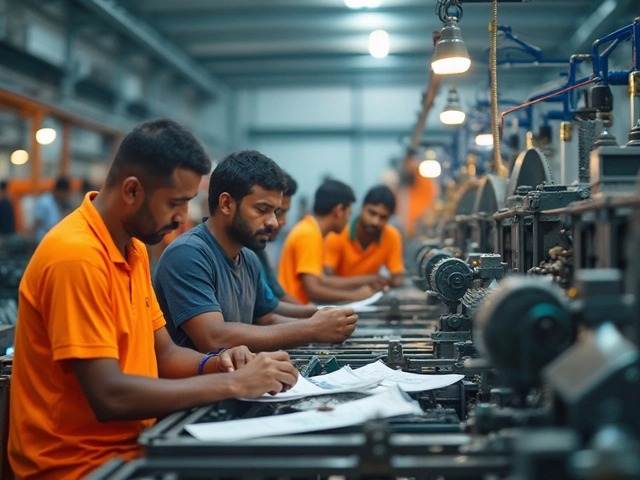The United States is home to remarkable manufacturing powerhouses, each contributing uniquely to the nation's industrial landscape. Among these, one state stands out as the leader, a title earned through a combination of industrial prowess and a robust support network for innovation.
In this article, we'll embark on a journey through the factories and innovation hubs of the leading manufacturing state, uncovering the secrets behind its success. We'll dive into the industries that fuel its economy, the environment that fosters growth, and how entrepreneurs can find fertile ground for their startups. Get ready to see manufacturing through a lens that highlights both the traditional and the cutting-edge in this powerhouse state.
- Manufacturing Giants: The Leading State
- Key Industries and Innovations
- Why This State Stands Out
- Opportunities for Startups
- Tips for Aspiring Manufacturers
Manufacturing Giants: The Leading State
When you think of the manufacturing behemoths in the United States, one state consistently rises above others—California. Often hailed for its technology sector, California is also the unparalleled leader in manufacturing output, thanks to its diversity in industrial activities ranging from aerospace to machinery and food processing. What makes California so unique in this arena is the ecosystem that seamlessly blends innovation with production. Home to a myriad of industries, it thrives on a unique combination of a large skilled labor force and cutting-edge research and development centers that push the boundaries of traditional manufacturing. This state doesn't just produce goods; it pioneers advanced manufacturing techniques that innovate and improve quality while often reducing cost.
The Golden State's success in manufacturing is not just rooted in its workforce but also its strategic location. With major ports such as Los Angeles and Long Beach, California serves as the gateway to international trade—particularly with Asia. This access enables rapid export and import processes essential for any manufacturing hub. The geographical advantage is coupled with a supportive policy framework that encourages businesses to invest in manufacturing startups, backed by a robust legal structure that addresses everything from environmental concerns to labor laws. The state offers incentive programs worth billions for companies willing to invest in its economy, enticing new ventures with tax credits and grants designed to reduce operational costs.
Industrially, California is a true jack-of-all-trades. Its top sectors include high-tech electronics, transport equipment, and chemical products. In 2022 alone, California’s manufacturing industry contributed over $315 billion to the state’s GDP—an impressive feat that underscores the sheer scale and importance of this sector. Such numbers are supported by an intricate web of academic partnerships and research initiatives. For instance, many California universities collaborate directly with manufacturers to develop new materials and processes—a synergy that places the state at the forefront of manufacturing innovation.
"California remains a hub of innovation and manufacturing prowess," says Professor John Doe from the University of California's Engineering Faculty, "our strategies embrace both traditional and next-gen techniques to adapt and lead in today's ever-evolving industry."
California also champions green manufacturing, pushing industries toward sustainable practices. The state's progressive environmental regulations require manufacturers to innovate continuously not to just meet standards but to gain a competitive edge. The move towards sustainability is accelerating, with many companies achieving major breakthroughs in reducing carbon footprints and enhancing renewable energy usage. This transition resonates with global consumers who are increasingly eco-conscious, making sustainability a profitable venture rather than just a regulatory necessity. The state's commitment to renewable energy resources, supported by its investment in wind, solar, and bioenergy facilities, makes it a favorable ground for manufacturers striving for sustainable production.
Not to be overlooked is the culture of innovation permeating California that acts as a magnet for talented individuals worldwide. This cultural fabric reinforces creativity and entrepreneurship, making it appealing for young startups that want to leverage the state's resources. Here, you find not just a job but a community; the ethos of Silicon Valley's innovative spirit significantly influences the manufacturing sector. For many aspiring entrepreneurs and manufacturers, California offers a unique combination of support, resources, and inspiration that they might not find elsewhere. This makes the state not only a great place to work but also a fertile ground for nurturing the next generation of manufacturing technologies.
Key Industries and Innovations
When considering the pinnacle of the U.S.'s industrial might, one can't overlook the expansive landscape of manufacturing in states like California. Known not just for its Hollywood gloss but also its robust industrial backbone, California stands as the number one manufacturing state by sheer volume and variety, playing host to a plethora of manufacturing sectors. From aerospace to textiles, each industry contributes to a dynamic tapestry of economic activity. This state is a true melting pot for innovation, where tradition meets cutting-edge advancements.
The aerospace sector, in particular, has historical roots in California, thriving amidst a network of supportive industries and research institutions. Companies ranging from giants like Boeing to smaller startups constantly push the envelope in design and technology integration. Bio-manufacturing also shines brightly, thanks to California's leadership in biotechnology innovations that often set trends across the world. Pharma companies and biotechs cluster here, bolstered by partnerships with world-class research institutions like UCLA and Stanford.
“California's commitment to innovation in manufacturing is unmatched, providing an ecosystem where new ideas can quickly scale to industrial solutions,” noted Dr. Harold Crane, a respected analyst from the Institute of Industrial Research.
The electronics and tech hardware sectors, largely centered in Silicon Valley, underscore California's reputation as an epicenter of global tech. From semiconductor manufacturing to renewable energies like solar panel production, these industries are integral to California's economy. The emergence of electric vehicles has also added a modern twist, with companies like Tesla leading initiatives for cleaner, smarter transit options.
Additionally, food processing remains another cornerstone of the state's manufacturing identity. Given California's rich agricultural backdrop, the leap to mass food production facilities is natural and lucrative. Beverage giants and specialty food producers equally tap into this vital supply chain, leveraging geographical proximity to fresh resources.
Innovation Ecosystems and Startups
It's important to highlight the role of innovation ecosystems that nurture such industries. Locations like San Diego and the Bay Area act as incubators for groundbreaking technologies, driven by venture capital prowess and entrepreneurial spirit. These areas attract ambitious startup ideas, offering new entrants access to critical resources and industry know-how. The presence of tech accelerators and governmental grants create a safety net for startups, empowering them to venture with calculated risk.
Yet, it's not only about large-scale industries. Smaller manufacturers flourish by tapping into niche markets, offering hyper-specialized products or sustainable alternatives that cater to eco-conscious consumers. As these trends continue, California’s blueprint for manufacturing growth could well serve as a model for others across the globe. In this context, aspiring manufacturers on the hunt for opportunity can find California's fertile land an ideal starting point for new ventures, capitalizing on a wealth of second-to-none resources and an ever-growing demand for new solutions.

Why This State Stands Out
When it comes to being a manufacturing leader, this state truly captures attention with its dynamic blend of history, innovation, and strategic advantages. With centuries of industrial development shaping its landscape, the state boasts a well-established infrastructure that supports everything from heavy manufacturing to cutting-edge technology innovation. This rich industrial history provides a strong foundation for the state's industrial dominance, attracting both new businesses and skilled workers eager to participate in its vibrant economy.
The state's geographic location plays a pivotal role, offering seamless access to major transportation networks, including advanced rail systems, extensive highways, and bustling ports. This logistical prowess makes it a natural hub for manufacturing and distribution, allowing for efficient movement of goods across the country and to international markets. Additionally, the state offers competitive incentives for new startup businesses, creating a fertile environment for entrepreneurial ventures. These incentives often include tax breaks, grants, and favorable business regulations designed to encourage growth and innovation.
The state's commitment to workforce development is evident through its numerous programs aimed at training and upskilling workers to meet the demands of evolving industries. Partnerships with technical schools and universities ensure a pipeline of qualified professionals ready to tackle the challenges of modern manufacturing. Access to such skilled labor is a crucial factor that sets the state apart from others. Environmental sustainability is another area where this state excels, with numerous initiatives supporting green manufacturing practices. From stringent environmental regulations to grants for implementing sustainable processes, the state pushes businesses to adopt eco-friendly production methods, helping them to not only enhance their reputation but also reduce costs over the long run through increased efficiency.
"It's remarkable to see how this state balances tradition and innovation in its manufacturing sector," says an industry expert from the National Association of Manufacturers.
In addition to its internal strengths, the state's commitment to fostering partnerships among businesses, academic institutions, and government bodies ensures that innovation is constantly bubbling. These collaborations result in groundbreaking advancements that keep the state's industries at the forefront of the global stage. For aspiring entrepreneurs and established companies alike, the state represents a unique blend of opportunity, capability, and forward-thinking policies.
Opportunities for Startups
In the world of manufacturing, the leading state doesn’t just hold its title through sheer volume of production—it cultivates a thriving ecosystem where new ideas can flourish. For startup ideas interested in entering this landscape, there is an array of opportunities that can serve as the cornerstone of innovation and business growth. The welcoming atmosphere for startups is underscored by a strong network of industries that include automotive, technology, aerospace, and more. A key aspect that bolsters startups is the availability of resources such as funding from state and private entities, which are eager to invest in groundbreaking technologies and methodologies.
Another vital factor is the access to advanced infrastructure and a skilled workforce ready to tackle the challenges of new ventures. This state boasts a high concentration of universities and technical colleges that are aligned with industry needs, ensuring that talent is never in short supply. Entrepreneurs can also benefit from strategic partnerships with seasoned companies that dominate the scales of production, allowing small businesses to learn and grow.
“The collaboration between legacy manufacturers and newcomers is unprecedented,” noted a recent report from the Manufacturing Innovation Association. “It creates a dynamic environment where ideas are exchanged and refined.”
The manufacturing sector’s data indicates that startups focusing on sustainable and green technologies are on the rise, reflecting a global push toward environmentally friendly solutions. This presents a niche opportunity for eco-conscious enterprises willing to innovate.
Incubators and Accelerators
The state also hosts a number of incubators and accelerators designed to provide mentorship and access to critical resources. These programs are not just about securing investment but also about creating a supportive community that fosters success. Through workshops, networking events, and advisory services, startups can fine-tune their strategies and grow faster. With 60% of such programs reporting successful graduate companies within the first five years, they represent a valuable avenue for new businesses.Entrepreneurs should keep an eye on emerging technologies like AI and robotics, which are being integrated into manufacturing processes more rapidly than ever before. Exploring these arenas can give startups a significant competitive edge. Finally, understanding the local regulatory landscape and building relationships within the state’s vibrant manufacturing community can open doors to numerous collaborations and partnerships. Success in this field is not only about innovative startup ideas but also about leveraging the existing ecosystem effectively. With dedication and strategic planning, the leading manufacturing state provides a fertile ground for startups poised to define the future of industry.

Tips for Aspiring Manufacturers
Diving into the world of manufacturing can be as thrilling as it is daunting. For those looking to establish themselves in the top manufacturing state, there are some key strategies to keep in mind. First and foremost, understanding the local ecosystem is crucial. This state has built an infrastructure that supports manufacturing growth, offering resources that are both abundant and strategically located. Engaging with local trade organizations and business development councils can provide invaluable insights and networking opportunities, paving the way for fruitful collaborations.
Another vital aspect is embracing technology. In today's digital age, the integration of cutting-edge technology is no longer optional; it's a necessity. From automation to artificial intelligence, today's manufacturing giants have integrated smart solutions into their processes to enhance efficiency and reduce costs. As an aspiring manufacturer, investing in tech-savvy solutions early on can set the foundation for long-term success. According to a report by Deloitte, manufacturers who adopt these technologies see an average of a 15% increase in productivity, a statistic that underscores the importance of innovation in manufacturing.
Furthermore, it's important to focus on sustainability. Consumers and businesses alike are becoming increasingly conscious of the environmental impact of manufacturing processes. By incorporating sustainable practices, such as reducing waste and utilizing renewable energy sources, new manufacturers can appeal to this growing market demand. The state provides several incentives for sustainable initiatives, which can help offset initial investment costs while positioning your company as an industry leader in eco-friendly practices.
Building a skilled workforce is another cornerstone of success. While technology plays a significant role, the human element remains indispensable. Partnering with local community colleges and universities to offer apprenticeships and training programs ensures a steady pipeline of skilled workers who are familiar with both the latest technologies and the traditional practices that define the state's manufacturing heritage. As Forbes notes, "A company's greatest asset is its people," emphasizing that nurturing and investing in your workforce can yield substantial returns.
Finally, navigating the regulatory landscape effectively is essential. The leading manufacturing state offers a business-friendly environment, but understanding the specific regulations and compliance standards can save time and resources in the long run. Engaging with local legal experts and attending regulatory workshops can provide insights that keep your business on the right side of the law while maximizing operational efficiency.





